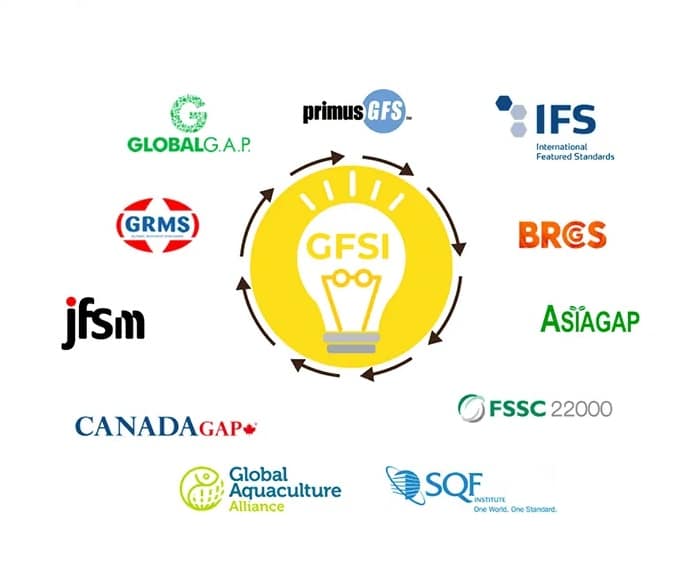Global Food Safety Initiative (GFSI) Certification: What it is and how to get certified
Global Food Safety Initiative (GFSI) Certification:
What it is, and how to get certified

What is GFSI (Global Food Safety Initiative)?
GFSI stands for The Global Food Safety Initiative, a business-driven initiative that develops food safety management systems to ensure food facilities are processing safe food for consumers. It is a private organization that oversees and approves different auditing platforms as meeting their criteria, providing a universal gold standard of recognition to specific food safety audits. Managed by The Consumer Goods Forum, GFSI benchmarks existing food standards against food safety criteria, as well as develops mechanisms to exchange information in the supply chain, raise consumer awareness, and review existing good retail practices.

Getting Started with the Global Food Safety Initiative (GFSI)
Getting Started with the Global Food Safety Initiative (GFSI) is a great way to demonstrate the safety and quality of your food products worldwide. GFSI is recognized worldwide as one of the most robust and rigorous food safety certification programs in the world. Obtaining GFSI certification demonstrates a company's commitment to providing safe, high-quality products to consumers and can help improve the company's reputation and competitiveness in the global marketplace.
The GFSI Board comprises members from major retailers, manufacturers, and food service operators and is coordinated by The Food Business Forum CIES. GFSI does not certify organizations. However, it has determined which food safety certifications it accepts or recognizes, which are then called GFSI Benchmarked Standards. Many organizations, such as big box stores, request that their suppliers achieve a "GFSI Benchmarked" certification scheme.
If you're interested in getting started with GFSI, you'll first need to understand what process is involved, how long it takes, and how much it costs to become certified. With this knowledge, you can start researching the various GFSI Benchmarked Standards and select the one that best fits your needs. A GFSI Consultant can provide you with this information.
GFSI (Global Food Safety Initiative) Certification
GFSI certification is a process by which a food manufacturer or supplier can have their food safety management system audited and certified against a GFSI benchmarked standard. Several GFSI benchmarked standards exist, such as the BRCGS Global Standard for Food Safety, the SQF Food Safety Code, and the FSSC 22000 Food Safety System Certification.
GFSI certification is not a legal requirement, but it is increasingly becoming a requirement for many retailers and food service providers. Certification can assure customers and consumers that the food manufacturer or supplier meets internationally recognized food safety standards.
To achieve GFSI certification, a food manufacturer or supplier must undergo a third-party audit of their food safety management system against a GFSI benchmarked standard. The audit is typically conducted by an accredited certification body to provide GFSI certification. If the food manufacturer or supplier meets the standard's requirements, they will be awarded GFSI certification.
Do I need to become GFSI certified? What does that mean for me?
Whether or not you need to become GFSI certified depends on your specific situation and the requirements of your customers and industry.
If you are a food manufacturer or supplier, becoming GFSI certified can be beneficial for several reasons:
- Meeting customer requirements: Many retailers and food service providers require their suppliers to be GFSI certified, so becoming certified can help you maintain or expand your customer base.
- Improving food safety: GFSI certification requires a robust food safety management system, which can help you identify and address potential hazards in your production process and ultimately improve the safety of your products.
- Demonstrating compliance: GFSI certification provides a way to demonstrate compliance with internationally recognized food safety standards, which can be helpful in regulatory and legal contexts.
However, becoming GFSI certified requires significant time, effort, and financial resources. You will need to develop and implement a food safety management system that meets the requirements of a GFSI benchmarked standard and undergo regular audits to maintain certification. It's important to consider the costs and benefits of GFSI certification for your specific situation before deciding whether or not to pursue it. A GFSI Consultant can guide you through the process of achieving a GFSI-benchmarked food safety certification.
What do I need to do? Where do I start?
If you're interested in pursuing GFSI certification, here are some steps to help you get started:
- Choose a GFSI benchmarked standard: There are several GFSI benchmarked standards to choose from, such as the BRCGS Global Standard for Food Safety, the SQF Food Safety Code, and the FSSC 22000 Food Safety System Certification. You should select the standard that best fits your needs and requirements.
- Understand the requirements of the standard: Review the requirements of the chosen standard to understand what is expected in terms of food safety management systems, policies, procedures, and documentation.
- Conduct a gap analysis: Conduct a gap analysis to identify any areas where your current food safety management system does not meet the requirements of the chosen standard. This will help you develop a plan to address gaps and bring your system up to standard.
- Develop and implement a food safety management system: Develop and implement a food safety management system that meets the requirements of the chosen standard. This may involve developing policies and procedures, training employees, and implementing monitoring and verification activities.
- Choose a certification body: Choose a certification body accredited to provide GFSI certification against the chosen standard. The certification body will conduct an audit of your food safety management system to determine if it meets the requirements of the standard.
- Prepare for the certification audit: Prepare for the certification audit by conducting internal audits, reviewing documentation, and addressing any non-conformities identified during the gap analysis.
- Undergo the certification audit: Undergo the certification audit by the chosen certification body. If your food safety management system meets the standard's requirements, you will be awarded GFSI certification.
- Maintain certification: Maintain certification by undergoing regular surveillance audits to ensure ongoing compliance with the standard.
It's important to note that becoming GFSI certified can be complex and time-consuming. Therefore, consider working with a consultant to help you navigate the process.
What are the benefits of GFSI certification?
GFSI certification offers several benefits for food manufacturers and suppliers, including:
- Enhanced food safety: GFSI certification requires a rigorous and comprehensive food safety management system, which can help to identify and mitigate potential hazards in the production process. This can help improve food products' safety and reduce the risk of foodborne illness.
- Increased customer confidence: GFSI certification is recognized worldwide and is often a requirement for doing business with many major retailers and food service providers. Being certified can demonstrate to customers and consumers that you are committed to food safety and meeting internationally recognized standards.
- Improved efficiency and productivity: Implementing a food safety management system as part of the GFSI certification process can lead to improved efficiency and productivity in the production process. This can help to reduce waste, improve resource utilization, and increase profitability.
- Access to global markets: GFSI certification is recognized worldwide and can help open up new product markets. Many countries and regions require compliance with GFSI benchmarked standards for food imports, so being certified can help you meet those requirements and expand your business.
- Compliance with regulations: GFSI certification can help to ensure compliance with food safety regulations and reduce the risk of legal and regulatory action. Many regulations require compliance with recognized food safety standards, and being GFSI-certified can help demonstrate compliance.
Overall, GFSI certification can provide significant benefits for food manufacturers and suppliers, including improved food safety, increased customer confidence, improved efficiency, and productivity, access to global markets, and compliance with regulations.
A Systematic Approach to Compliance
When it comes to certification audits or legal compliance you need to be sure that all of your bases are covered. Our consultants are highly qualified professionals who pride themselves on a 100% success rate. Get certified on time and on budget. Schedule a free consultation now.
